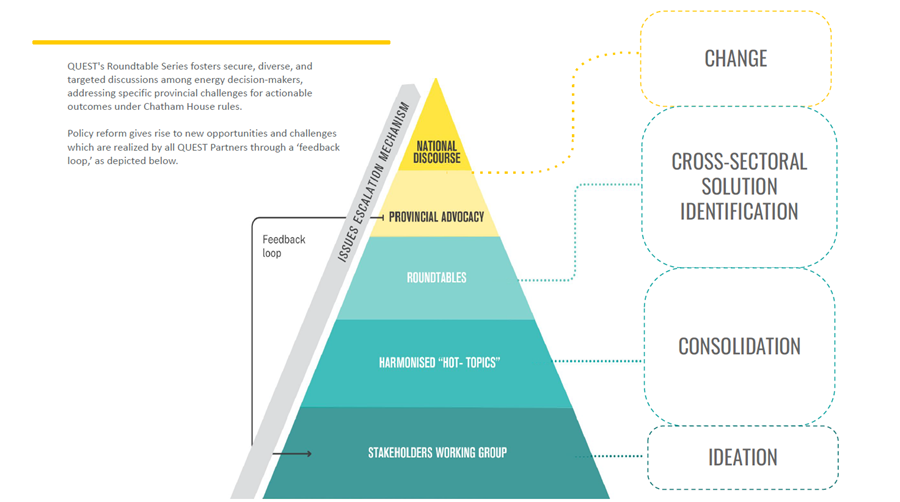Energy Transition Policy Program
A collaborative discussion with energy decision-makers to align climate and energy transition planning and policies.
About the ETPP
The objective of QUEST Canada’s Energy Transition Policy Program is to engage in a collaborative discussion with energy decision-makers to align climate and energy transition planning and policies that will facilitate sustainable community energy systems in support of a net-zero carbon (carbon neutral) economy by 2050.
Part of QUEST Canada’s value proposition is that we work and interact with stakeholders in the energy sector across Canada. Their interests, perspectives, and priorities are incredibly diverse – but certain commonalities emerge from dialogue that our unique position allows us to observe and help synthesize.
In our conversations with communities, utilities, system operators, large energy users, and more, we consistently see a need for greater alignment between the plans of different stakeholders working toward broadly similar objectives for the energy transition.
Our goal here is to facilitate consultations in each of Canada’s provinces and territories to identify issues, barriers, and challenges.
Together with stakeholders, we will co-create a tailored approach to better enable an equitable energy transition for communities – including Indigenous, municipalities, towns, and their constituents.
ETPP Methodology:

First Steps: Engagement, Virtual Workshops & Provincial Roundtables
Our process will consist of the following steps:
- Bilateral Engagements: one-on-one discussions with stakeholders to identify barriers and issues;
- Virtual Workshops: to refine a list of barriers and issues and identify common interests; and,
- Provincial Roundtables: with participation from up to 20 key stakeholders, to develop key policy recommendations. Outputs from provincial roundtables will also be used by QUEST Canada to help inform Federal policy development, where applicable.
Key reasons why we welcome engagement in the ETPP:
- We see a potential disconnect between planning by communities to provide energy and energy services to their citizens and planning by system planners and regulators to provide energy and energy services to the province as a whole.
- Regulatory decisions being made to avoid stranded costs from existing and potentially new infrastructure may unintentionally limit, or even preclude, market-based options as carbon management technologies evolve.
- Enabling community participation in planning and processes that provide energy services for the province as a whole can help provide more accurate information to system planners, regulators and policy decision makers.
- Well coordinated energy solutions can also provide communities with a financial opportunity to invest in services that address social issues for their citizens.
- The sharing of information achieved through community participation in planning processes can achieve greater social license. With greater local understanding, there can be increased support for necessary investment, for innovative solutions addressed in regulatory forums, for the nature of energy systems growth, and the enablement of energy efficiency solutions that can reduce system growth needs.
Stakeholders To-date
We believe the ETPP can work by:
- Facilitating open, respectful dialogue between diverse interest groups and government bodies, on a province by province basis;
- Promoting collaborative processes that encourage cooperation, consensus-building and collective action;
- Championing well-rounded, evidence-based, and co-created policies that foster sustainable outcomes; and,
- Providing a platform for nation-wide knowledge sharing that leverages QUEST’s entire network to identify areas where policy reform is needed most.
To-date, QUEST Canada is engaging in collaborative discussion with representatives of these community energy transition stakeholders:
Alberta Ecotrust
Alberta Energy Efficiency Alliance
Alberta Electric System Operator
Alberta Municipalities
Alberta Innovates
Apex Utilities
Cenovus
City of Calgary
Cold Lake First Nations
Dunsky
Edmonton Global
Energy Futures Lab
Rural Municipalities of Alberta
SOFIAC
University of Calgary
Funding
The ETPP is being made possible by the generous contributions of our key program sponsors Cenovus Energy and Enbridge Gas.
Program Inquiries
Please contact QUEST Canada’s Senior Lead, Policy, Andrei (Andy) Nikiforuk at anikiforuk@questcanada.org


